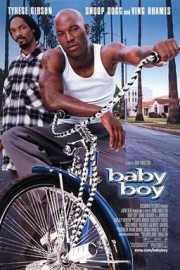Baby Boy
A decade after “Boyz N the Hood,” John Singleton looked at the lives of young men on the streets of South Central LA again, but “Baby Boy” isn’t about treading the same territory. Whereas “Boyz N the Hood” followed young men on the cusp of adulthood, “Baby Boy” is about an adult man who still lives like a young man, without respecting the responsibilities of what being an adult means. That I saw “Baby Boy” first, in theatres, says more to how my moviegoing habits progressed than my interest in Singleton as a filmmaker, although it did take a shamefully long time for me to get to “Boyz N the Hood.”
Since Singleton cast him as Roman in “2 Fast 2 Furious,” Tyrese Gibson has spent much of the past 20 years in action films, with little effort required as a serious actor. I get it- he’s got the physique for the genre- but seeing him as Jody for the first time in two decades reminds me of how horrible Hollywood is when it comes to typecasting Black actors like he and Djimon Hounsou as “heavys” or action meatheads as opposed to serious performers. I’m not saying his work in “Baby Boy” is revelatory, but watching the way he maneuvers between tender affection, charismatic charmer and hot headed rage is something I don’t know if enough people appreciate enough in him.
For a long time, I had a lot in common with Jody in my 20s. I was too reliant on my parents, still lived at home, and kind of dicked off while not really showing much responsibility. Eventually, I began to take more and more responsibility, and grew up. Some people have an easier time of that than others, and there are a multitude of reasons why it is easier for some people over others. Having a film like “Baby Boy” helps illuminate how hard it can be for some of us to get out of that mentality, and tragically, life-and-death situations sometimes are the trigger for that change. For Jody, though, such extremes are necessary.
Jody (Gibson) is a 20-year-old still living with his mother (the fantastic A.J. Johnson) without a job- he mooches off of her on the reg- and two baby mamas, the most recent of whom is Yvette (Taraji P. Henson), whom he spends most of his time with. (He’s cordial with Peanut (Tamara LaSeon Bass), but they have an understanding of where things are.) His mom, Juanita, wants to give Jody everything, but when her new boyfriend, Melvin (Ving Rhames), comes into the picture, things start to get tense, and not even hanging out with his best friend, Sweetpea (Omar Gooding). Add to that Rodney (Yvette’s ex, played by Snoop Dogg), whom Yvette still talks to, and things start to spiral, especially when Jody’s irresponsible nature causes tension with the people he loves most.
In both “Boyz N the Hood” and “Baby Boy,” the father figures are important in helping try to steer the main characters in the right direction. For Cuba Gooding Jr.’s Tre, it was Laurence Fishburne; for Jody, it’s Melvin, but this isn’t a loving dynamic. Jody is protective of his mother, so at the start, Melvin is seen not just as a threat to her, but to the dynamic they have with one another. Melvin has reasons for Jody to be concerned- before he met Juanita, Melvin was a street criminal, and he still has the attitude of one, even though he has turned his life around, and now owns his own business. Rhames is wonderful in the role, and the way he uses his imposing figure (and voice) going up against Tyrese makes for some of the strongest parts of the movie, from drag-out fights and threats to even a scene late in the movie where nothing is said, and a gun passes from one person to another. By the end, they are on the same page at last, because Jody has matured.
Though a lot of the moments in “Baby Boy” are as authentic as what Singleton presented in “Boyz N the Hood,” the film is ultimately more plotting and feels more contrived than its predecessor. But it’s those moments of authenticity that make any Singleton film worth remembering. Here, it’s pretty much every moment Gibson and Henson are together, the love between Rhames and Johnson, as well as moments I hinted at above between Gibson and Rhames. “Baby Boy” starts out with a great opening wherein Singleton lays out the premise behind the film’s title before, for the next two hours-plus, deconstructing one person living that life, and building him into what he needs to be moving forward. It’s a fascinating experience of a film.










